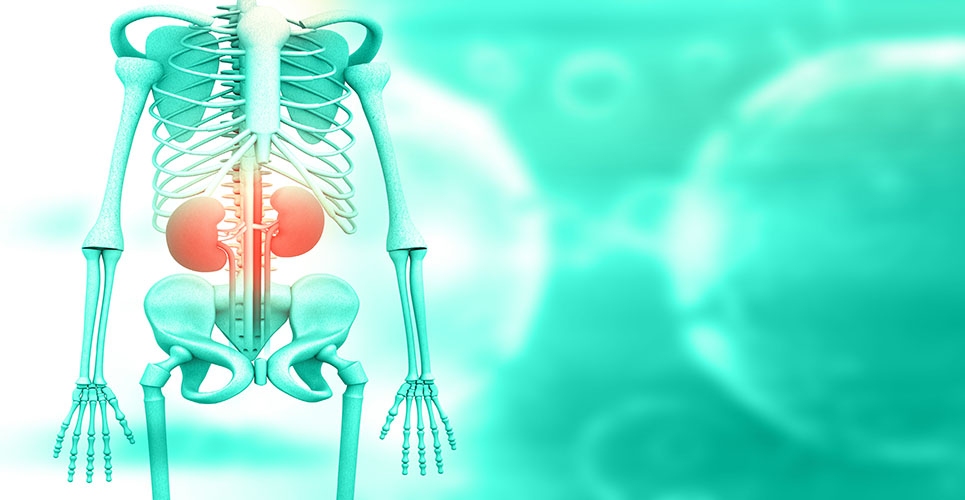From today, people in Scotland with the genetic kidney disease ADPKD could benefit from JINARC® (tolvaptan) following advice issued by the Scottish Medicines Consortium (SMC) for its use in adults with chronic kidney disease (CKD) stages 1–3 at the start of treatment with evidence of rapidly progressing disease.1 Tolvaptan is the first and only medicine to treat the underlying cause of ADPKD and delay its progression. This advice takes account of the SMC’s Patient and Clinician Engagement (PACE) process and is in addition to guidance issued in October 2015 by the National Institute for Health and Care Excellence (NICE) for NHS England.
ADPKD is the most common inherited kidney disease and is primarily characterised by the development and enlargement of multiple fluid-filled kidney cysts leading to an increase in kidney size and further complications including chronic and acute pain, hypertension and, ultimately, kidney failure. Approximately half of people diagnosed with ADPKD will progress to end-stage renal disease (ESRD) and require a kidney transplant or dialysis by the age of 54.
“ADPKD has been likened to a ‘ticking time bomb in your belly’ due to its unpredictable nature and devastating impact on families,” said Tess Harris, Chief Executive of the PKD Charity. “For the first time, we have a treatment that can delay the progression of this disease, which brings hope for patients as well as future generations of ADPKD sufferers.”
In developing the advice for tolvaptan, the SMC considered data from the Phase III TEMPO 3:4 Trial – the largest clinical trial ever undertaken in ADPKD. Over a three year period, the study demonstrated a significant reduction of approximately half (49.2%, p<0.0001 relative reduction), which was a 2.7% absolute reduction in the annual increase in total kidney volume for tolvaptan-treated patients versus those taking placebo. Furthermore, tolvaptan was shown to reduce the rate of decline in kidney function compared to that of placebo-treated patients by approximately 32% (p <0.001, relative reduction) (absolute reduction [1.20mg/ml]-1).3 Patients taking tolvaptan were also 36% (relative reduction) less likely to experience clinically significant kidney pain compared to those taking placebo (p=0.007), (absolute reduction two events per 100 person year). Side effects associated with the way the drug works, for example, thirst, polyuria, pollakiuria were observed in patients taking tolvaptan.7 A low, manageable risk of liver injury, monitored with regular blood tests, was also identified.7
Dr Stewart Lambie, Consultant in renal and general medicine at the Raigmore Hospital, Inverness commented: “This is a huge step forward in the management of patients with ADPKD who previously had no specific treatment available to them. It is fantastic news that patients now have access to a treatment that will significantly delay their need for dialysis or a kidney transplant.”
References:
- Scottish Medicines Consortium. Detailed Advice Document: tolvaptan 15mg, 30mg, 45mg, 60mg and 90mg tablets (Jinarc®). SMC No. 1114/15. January 2016.
- National Institute for Health and Care Excellence (NICE). Technology Appraisal Guidance TA358. Available online: https://www.nice.org.uk/guidance/ta358 (last accessed January 2015).
- Torres VE, Harris PC et al. Tolvaptan in patients with autosomal dominant polycystic kidney disease. The New England Journal of Medicine. 2012;367(25):2407–18.
- Patel V, Chowdhury R et al. Advances in the pathogenesis and treatment of polycystic kidney disease. Current Opinion in Nephrology and Hypertension. 2009;18:99–106.
- Takiar V, Caplan MJ. Polycystic kidney disease: pathogenesis and potential therapies. Biochimica et Biophysica Acta 2011;1812(10):1337–43.
- Alam A, Perrone RD. Management of ESRD in Patients With Autosomal Dominant Polycystic Kidney Disease. Advances in Chronic Kidney Disease, Vol 17, No 2. March 2010: pp 164–72.
- JINARC® (tolvaptan) summary of product characteristics 2015

